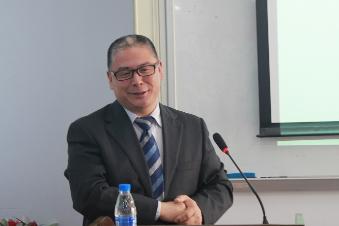
On November 26th, Prof. YANG Feng from Shanghai Jiao Tong University was invited to deliver a lecture entitled Inspiration of Mo’s Winning Nobel Prize to Literature Translation and the Spread of Chinese Culture. Doctor LI Yingyuan, on behalf of the School of Foreign Languages, South China University of Technology, officiated the lecture.
The speaker, Prof. YANG Feng, is research professor of Center for Translation Studies and Lexicography of Shanghai Jiao Tong University. He is also the chief-editor of Contemporary Foreign Languages Studies, the member of National Association of Foreign Language Education.
The lecture covered MO Yan’s influence in academic, theoretical and cultural field, along with some knowledgeable remarks on intercultural communication and literature translation.
Prof. YANG first explained why MO Yan won the prize. He owed Mo’s success to writer’s own talent, hard work of translators and China’s increasing comprehensive national power. Mo’s masterpieces all have immense world view and profound theme, with no detraction from the uniqueness of Chinese element, as well as writer’s humanistic care. At the same time, good translation makes it possible for readers around the world to receive and accept writer’s idea. In addition, film adaption, international cultural event and scholarly communication all help to the world-wide reputation of MO’s works.
In the second part of the speech, Prof. Yang introduced the present situation of Chinese culture moving towards the world. Although lots of official events held to disseminate Chinese culture, the consequence was still arguable. On the other hand, MO Yan’s awarding was undoubtedly a great enhancement to China’s cultural soft strength. Therefore, he said it is more efficient to display Chinese development in this way than to merely build Confucius institutes where people could not essentially acquire an all-round knowledge about China and Chinese culture. Prof. YANG also added that the importance of translation in cultural transmission could be revalued.
The final part of the speech is about translators and translation. Prof. YANG shared his ideas with the audience in how to bring life to literature translation. He firstly introduced some theories regarding manipulation and sponsors. Translation should avoid being insular, but work for certain goal and audiences. Only when a translation work derives from certain ideology and acts on that ideology in turn can it be of historic significance. He pointed out that translation should be grounded on practice and get rid of the restriction of classic theories. “A good translation work should be easy to read, accept, spread, so as to be influential.” Translators should try to take readers’ preference and acceptability into consideration, and choose translation strategies flexibly. Prof. YANG also suggested students majoring in translation should made self-improvement in both English and Chinese fields, Prof. YANG’s observations gave rise to an animated and lively discussion. To all the questions raised by teachers and students, Prof. YANG gave patient answers. The lecture was rounded off with warm applauses.
Reported by ZHANG Xiaoyu

